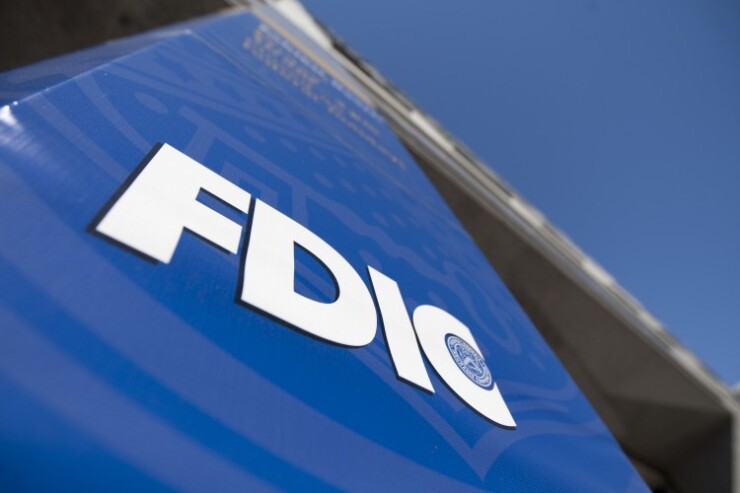
WASHINGTON — The Federal Deposit Insurance Corp.'s proposed statement of policy on bank merger transactions issued Thursday has made the administration's widely-understood skepticism of bank consolidation official, especially when it comes to large firms.
Brian Graham, a partner with the Klaros Group, said the SOP — which is expected to heighten Biden-era regulators' emphasis on financial stability and competitiveness of markets when vetting deals — is likely to increase frustration among larger institutions aiming to merge.
"[It highlights] how brutally challenging it is to be a bank with assets between $50B and $250B, which face the same regulatory costs of JPMorgan but are [fifteen times] smaller — and regulators seem unlikely to permit them to merge to gain scale," Graham said. "When combined with the acting comptroller's
Ian Katz, a managing director at Capital Alpha Partners, argued some mergers above the $50 billion mark could still be approved. However, he said, the larger the firm, the steeper the odds of success.
"The current set of bank regulators may approve some non-small-bank M&A applications — particularly in the name of financial stability if the target bank is troubled," said Katz. "But mergers among midsized to large banks are tougher and will take longer, but are not impossible."
Randy Benjenk of the law firm Covington argues the updated policy statement entrenches the current FDIC's skepticism of mergers by creating additional hooks for deal parties to be caught on.
"The policy statement would create new ways for transactions to fall short of the FDIC's standards of approvability, which means that banks may enter into fewer M&A transactions," said Benjenk. "The FDIC will take longer to review the transactions that do get signed, and the FDIC may deny more applications than in the past."
During the comment process on the proposal, Benjenk said the banking industry is sure to target several aspects of the policy statement that depart from existing practices. FDIC Vice Chair Travis Hill opened the door to many of these objections in
Some of the notable updates include a more extensive evaluation of the competitive effects of the merger. The agency's
Another major shift is the idea that acquirers must affirmatively show a merger will enable them to better meet the banking needs of the community. Hill noted this standard appears to be a higher bar compared with the status quo, in which currently the FDIC must consider the needs of a community. The banking industry will likely balk at this standard — which builds on banks' Community Reinvestment Act regulatory requirements, which some banks have
The SOP also creates the potential for more public hearings on merger transactions, which Benjenk says could slow or complicate the progress of applications.
"The FDIC is saying that it will generally hold hearings whenever the resulting bank would be $50 billion or more in assets or whenever a significant number of CRA protests have been filed," said Benjenk. "Hearings on an application [can] be a distraction for management teams that are focusing on integration planning and generally do not change the information available to regulators."
Benjenk also argues the FDIC seems to be exceeding its explicit statutory mandate in certain areas like considering the impact on employment. Banks
"The FDIC is saying it will consider job losses and lost job opportunity from changes to branch networks, the 'reasonableness of fees, expenses, and other payments made to insiders' — which seems to be a new concern the FDIC doesn't explain anywhere in the proposal — and the use of noncompete agreements when acquirers must divest branches," Benjenk said.
FDIC is not the only agency which reviews mergers, however. The other two major banking agencies — the Federal Reserve and Office of the Comptroller of the Currency — also have a hand in merger review, depending on the charters of the firms concerned. Many large mergers — like Capital One Financial's
Relatively few large banks fall directly under FDIC supervision for merger review purposes, and so the FDIC's policy would have a relatively limited impact on merger activity generally. The OCC also
The FDIC, however, has a central role as the federal insurer of banks. The agency's revised SOP reaffirms its authority to review mergers or consolidations involving an FDIC-insured bank and any uninsured financial institution, as outlined in the Bank Merger Act.
The industry already began expressing its disapproval of the proposed SOP following the release of the proposal. American Bankers Association President Rob Nichols said the expansive criteria introduce unwelcome uncertainty into the merger process.
"Because [the proposal] lacks details about the updated competitive analysis, the new policy would introduce more unpredictability and potential delays into merger approvals, which could have serious adverse effects on banks seeking a merger," said Nichols. "We will closely review today's proposed policy statement and the recent OCC proposal and will be prepared to offer our comments, including whether the proposals comply with statutory requirements and enable banks of all sizes and business models to flourish."
With an impending election, Graham also noted that the split FDIC board vote indicates the diminishing number of nonpartisan issues in bank regulation. He says that means the election will have serious consequences on the industry.
"Banking regulation didn't use to be a partisan topic, but it is now," he said. "The outcome of the presidential election has huge stakes for banks and bank regulation [and] the potential oscillation between extremes (e.g. shift from first Trump administration to Biden) creates even more uncertainty and challenges for bankers to navigate."







